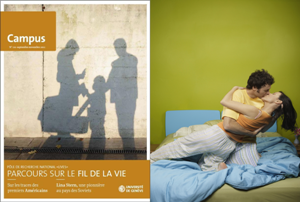Atelier 2012-2013 : Critical events and family configurations
The research class (“Atelier”) of the Master program in sociology of 2012-2013 will be dedicated to “critical events and family configurations”. It intends to uncover how different broad family contexts react to critical life events and what is the impact of those family contexts on conjugal and parent-child vulnerability. The de-standardization of the life course associated with the risk society creates many opportunities for critical events to impact on the organization of families. The strategies set up by families to face unemployment and precariousness, economic insecurity, downward social mobility, health problems, family breakups, or frequent spatial mobility, should be addressed using large and longitudinal datasets which do not only consider relationships within households but also other relationships such as those between grandparents and grandchildren, divorced parents, stepfamily members, uncles/aunts and nephews, godparents, etc. Are families facing hardship due to the so called “new risks” successful in maintaining sound levels of conjugal satisfaction, in pursuing their parental projects or in providing enough support to children? How are relationships between partners, parents and children, as well as other family relationships, modified in order to adapt to family-work conflict and employment instability? How social inequalities by gender, generation, and social class arise from such reorganization?
The data source is the panel “Social Stratification, Cohesion and Conflict in Contemporary Families”, collected in 1999 by Widmer, Kellerhals and Levy (2003), including data from 1534 couples residing in Switzerland (first wave at the end of the nineties; second wave in 2004, third wave in 2011). Critical life events and life transitions, and their effects on family relationships are the focal themes of the research. The research class will use the full strength of the fifteen year longitudinal assessment of family life.
Some experience with statistical packages is expected from participants. Participants will learn by doing how to perform a quantitative study in the social sciences using original data drawn from the IP8 - NCCR LIVES project . The outcome of the research class is the production of a scientific paper implementing the highest quality standards of the social sciences. Languages of the research class are english and french.
Further informations
-
Famille: la recette du bonheur conjugal
Dossier "Parcours sur le fil de la vie - NCCR LIVES"
dans Campus N°110 (magazine de l'UniGE)
- Follow the literature review (on Mendeley)
- Login Chamilo
- Contact prof. Eric D. Widmer
- Flyer
References
- Kellerhals, Jean, Eric Widmer et René Levy (2004). Mesure et démesure du couple: cohésion, crises et résilience dans la vie des couples. Paris: Payot.
- Widmer, Eric, Jean Kellerhals et René Levy (2003). Couples Contemporains - Cohésion, Régulation Et Conflits: Une Enquête Sociologique. Zurich: Seismo.
- Widmer, Eric, Jean Kellerhals and René Levy (2004). Types of Conjugal Networks, Conjugal Conflict and Conjugal Quality. European Sociological Review 20(1), 63-77.
- Widmer, Eric (2006). Who are my family members? Bridging and binding social capital in family configurations. Journal of Social and Personal Relationships 23(6), 979-998.
- Widmer, Eric, Jean-Marie LeGoff, René Levy, Raphaël Hammer and Jean Kellerhals (2006). Embedded parenting? The influence of conjugal networks on parent–child relationships. Journal of Social and Personal Relationships 23(3) : 387-406.
- Widmer, Eric, Francesco Giudici, Jean-Marie Le Goff and Alexandre Pollien (2009). From Support to Control: A Configurational Perspective on Conjual Quality. Journal of Marriage and Family 71(3): 437–448.

